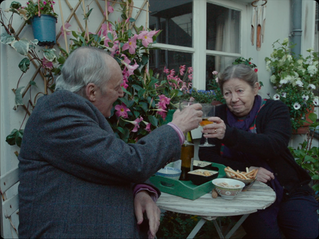Waking Life
- Isobel Wise
- Dec 5, 2020
- 2 min read
Richard Linklater, 2001

Waking Life is cerebral to the point of monomania. Drifting through a dream-state that wavers in lucidity, the anonymous protagonist (Wiley Wiggins) weaves his way through a series of vignettes. As he flies over cityscapes, gliding between locales and social groups, he lands within conversations that ponder, conditional to those present, the futility, collectivity, and ineffability of human experience. The incessant philosophising is at once exhausting and reinvigorating — to Wiggins and the audience alike. Cameos from Julie Delpy and Ethan Hawke, filmmaker Steven Soderbergh, InfoWars founder Alex Jones, and Linklater himself, proffer musings that explore individual consciousness, free will, religion, language, human connection and innovation, fate, and the veridicality, or lack thereof, of life itself.

Despite being unbound by time, and on occasion, gravity, this film is not escapist cinema. It confronts hard truths whilst fundamentally denying the corporeal, not only through its unating pontification but through its aesthetic. A superb, yet abstract, take on roboscoping, the film restlessly flirts with different animation styles throughout its runtime. The relentless throbbing and warping of every surface is arresting; facial features morph, landscapes bulge, the slightest movement is wildly exaggerated. Visually the film is as hypnotic as it is surreal. It is this constant re-illustration that liberates Waking Life, elevating what is, essentially, Linklater’s idiosyncrasies given form. The film decries passivity, but through the gesture of dialogue only. Conversations may vocalise the desire for “real human moments” and true comprehension, but ways of satiating such yearning are never volunteered. Instead the protagonist is left in a perpetual state of inertia, one that is at odds with the movement celebrated by the animation. Prescribing the idea that “a life understood is a life lived”, Linklater seemingly attempts to elucidate the meaning of existence without ever seeking the pragmatic, never lingering on the possibility that enjoyment could stem from ignorance of one’s own futility. Where Waking Life falls on the spectrum between profundity and pure pretension hinges upon your own credence to this notion. Perhaps to confront the limits of our understanding is clarity enough?









Comments